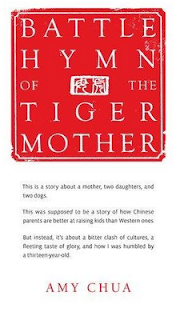“What Does Asian American literature have to say about the issues raised by the recent discussion of Amy Chua’s book?” — This blog post is the second in a series by Prof. Patricia Chu. Read the first post here.
Part Two: Generational Confusion—Tiger Sisterhood
by Patricia Chu
So mothers and daughters in Asian American lit are odd couples: the mothers have learned to “eat bitter,” endure, and place their powers at the service of the collective survival of the family—or at least, their children—in order to survive in harsh conditions in the Old World or America; the children, as critic Sau-ling Cynthia Wong has remarked, want to taste the sweet things in their American life. But the best of these stories also give voice to the perspectives of the immigrants. Asian woman aren’t just born intolerant perfectionists. They have had to be extra cunning and extra adaptable to survive, to protect their families, and to develop a legacy of confidence, cunning, and cash to pass onto their children. Their authority derives from their true grit.
I can show you too, that the superiority complex that Chua assumes is familiar, and often satirized, in Chinese American literature; and that Gish Jen has described the educated Chinese immigrant’s pride in his education as a “steel rib” needed to compensate for the sudden shock of cultural marginalization as a minority in America. Biographers Winberg and May-lee Chai, among others, demonstrate how the powerful instincts needed to survive wartime Chinese politics may lead to paranoia and isolation in the U.S. In Jen’s “Who’s Irish?” she captures this dynamic brilliantly by creating the character of a Chinese immigrant mother whose hypercritical attitudes render her unwelcome in her married daughter’s household. If this sounds like a description of other ethnic groups, it should: as Chua notes, Chinese Motherhood is not unique to Chinese mothers.
To move for a moment into a real-life example, my aunt recently told me the story of how my cousin learned English and became a physics professor in America. During the Cultural Revolution, my cousin,then a teenager, was denied education and sent to be “reeducated” by working the fields in an isolated village, because of her bad family background. (My uncle had studied in America.) He gave her his old chemistry and physics textbooks to study at night, by candlelight. The village leaders planned a meeting to denounce her for her selfish elitism, but she insisted that educated specialists would one day be needed to modernize the countryside, to bring plumbing and electricity to the village. The meeting was cancelled. When the colleges reopened after a decade of anti-intellectual and anti-foreign turmoil, my cousin was one of the few young people able to pass the entrance exams because of her night study.
A few years later, when Deng Xiaopeng authorized study abroad in America, she was selected because she was one of the few who knew English. She had learned her English from those few science textbooks and an English grammar book. Although she planned to return to China when she received her Ph.D. in Physics, she was horrified by the government’s attacks on their own protesters in the Tiananmen Square demonstrations of 1989, and therefore stayed in the U.S.
Without accusing my cousin of Extreme Parenting, I can claim that such a brilliant and resourceful survivor would have a visceral reason to demand a higher standard from her children than someone like myself, an ABC (American Born Chinese) Ivy-educated professor who is able to assume my children will go to college if their performance is above average; and her children would have good reason to rely on her judgment about their education. Second-gen Chinese respect this kind of legacy and appreciate the positive results, but having experienced the costs as well, they typically do not want to reproduce their parents’ narrow ideas; the arrogance is optional, too. And let me add, again, that achievement in the face of difficulty, and the passing on of psychological imperatives from parents to children, is not limited to Chinese or to Asian Americans. Amy Chua, however, strikes fear into second generation Chinese hearts by giving the white American public the impression that we’re all like her—a second generation American with the iron will and blinders we saw in our parents.
Which brings us to the Model Minority Problem.
NEXT POST — PART 3: Who’s afraid of the Wall Street Journal? or, “I am the very Model of a Mommy Major General”

